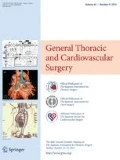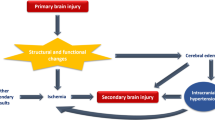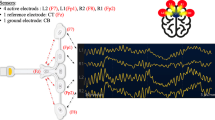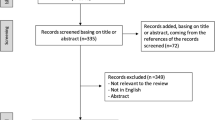Abstract
Objective: The effect of post-ischemic mild hypothermia applied immediately after induced transient ischemia on the extent of neuronal damage to the spinal cord was investigated in rabbit.Subjects and Method: A 15-minute period of transient abdominal aortic occlusion for spinal cord ischemia at a rectal temperature of 37.3±0.3°C was performed just below the left renal vein via median laparotomy. Three groups of rabbits were investigated; Group 1 (n=8) subjected to ischemia and reperfused at the same temperature for 7 hours, Group 2 (n=8) also subjected to ischemia and then to 6 hours of systemic hypothermia (32.5±0.5°C), and Group 3 (n=8) non-ischemic controls. All the rabbits in Group 1 and Group 2 were sacrificed at 1 week after ischemic injury. Spinal cord sections were examined microscopically to determine the extent of ischemic neuronal damage.Results: The mean modified Tarlov’s score at 1 week after ischemic injury was 0.5±0.8 in Group 1, whereas it was 4.4±1.4 (p<.001) in Group 2. The mean total number of surviving neurons within examined sections of the spinal cord was significantly greater in Group 2 than in Group 1 (Group 1: 81±66.1 vs Group 2: 300.9±154.1, p<.001).Conclusions: Post-ischemic hypothermia induced immediately after reperfusion significantly reduced ischemia-induced neuronal damage in rabbit.
Similar content being viewed by others
References
Svensson LG, Crawford ES, Hess KR, Coselli JS, Safi HJ. Experience with 1509 patients undergoing thoracoabdominal aortic operations. J Vasc Surg 1993; 17: 357–70.
Ueda T, Shimizu H, Mori A, Kashima I, Moro K, Kawada S. Selective perfusion of segmental arteries in patients undergoing thoracoabdominal aortic surgery. Ann Thorac Surg 2000; 70: 38–43.
Woloszyn TT, Marini CP, Coons MS, Nathan IM, Basu S, Acinapura AJ, et al. Cerebrospinal fluid drainage and steroids provide better spinal cord protection during aortic cross-clamping than does either treatment alone. Ann Thorac Surg 1990, 49: 78–83.
Gonzalez-Fajardo JA, Aguirre B, Perez-Burkhardt JL, Alvarez T, Fernandez L, Ramos G, et al. Epidural regional hypothermia for prevention of paraplegia after aortic occlusion experimental evaluation in rabbit model. J Vasc Surg 1996; 23: 446–52.
Marsala M, Vanicky I, Yaksh TL. Effect of graded hypothermia (27 to 34°C) on behavioral function, histopathology, and spinal blood flow after spinal ischemia in rat. Stroke 1994; 25: 2038–46.
Sakurai M, Hayashi T, Abe K, Mitsuaki S, Tabayashi K. Delayed and selective motor neuron death after transient spinal ischemia: A role of apoptosis? J Thorac Cardiovasc Surg 1998, 115: 1310–5.
Kirino T. Delayed neuronal death in the gerbil hippocampus following ischemia. Brain Res 1982; 239: 57–69.
Mitani A, Kataoka K. Critical levels of extracellular glutamate mediating gerbil hippocampal delayed neuronal death during hypothermia, brain microdialysis study. Neurosci 1991; 42: 661–70.
Ginsburg MD, Busto R, Castella Y, Valdes I, Loor J. The protective effect of moderate intra-ischemic brain hypothermia is associated with improved post-ischemic glucose utilization and blood flow. J Cereb Blood Flow Metab 1989, 9(Suppl 1): S380.
Kuroiwa T, Shibutani M, Okeda N. Non-hyperemic blood flow restoration and brain edema in experimental focal cerebral ischemia. J Neurosurg 1989; 70: 73–80.
Busto R, Globus MY-T, Dietrich D, Martinez E, Valdes I, Ginsburg MD. Effect of mild hypothermia on ischemia-induced release of neurotrasmitters and free fatty acids in rat brain. Stroke 1989; 20: 904–10.
Bergstedt K, Hu RR, Wieloch T. Post-ischemic changes in protein synthesis in the rat brain: effects of hypothermia. Exp Brain Res 1993; 95: 91–9.
Todd MM, Warner DS: A comfortable hypothesis reevaluated; cerebral metabolic depression and brain protection during ischemia. Anesthesiology 1992; 76: 161–4.
Oh SM, Betz AL. Interaction between free radicals and excitatory amino acids in the formation of ischemic brain edema in rats. Stroke 1991; 22: 915–21.
Dietrich WD, Busto R, Halley M, Valdes I. The importancve of brain temperature in alterations of the blood-brain barrier following cerebral ischemia. J Neuropathol Exp Neurol 1990; 49: 486–97.
Kuroiwa T, Shibutani M, Okeda R. Blood-brain barrier disruption and exacerbation of ischemic brain edema after restoration of blood flow in experimental focal cerebral ischemia. Acta Neuropathol 1988; 76: 62–70.
Colbourne F, Corbett D. Delayed and prolonged post-ischemic hypothermia is neuroprotective in the gerbil. Brain Res 1994; 654: 265–72.
Laptook AR, Corbett RJ, Sterett R, Burns DK, Garcia D, Tollefsbol G. Models hypothermia provides partial neuroprotection when used for immediate resuscitation after brain ischemia. Pediatr Res 1997; 42: 17–23.
Carrol M, Beek O. Protection against hippocampal CAI cell loss by post-ischemic hypothermia is dependent on delay of initiation and duration. Metab Brain Dis 1992; 7: 45–50.
Schwab S, Schwarz S, Spranger M, Keller E, Bertram M, Hacke W. Moderate hypothermia in the treatment of patients with severe middle cerebral artery infarction. Stroke 1998; 29: 2461–6.
Busto R, Dietrich WD, Globus MY-T, Schienberg P, Ginsberg M. Small differences in intra-ischemic brain temperature critically determine the extent of ischemic neuronal injury. J Cereb Blood Flow Metab 1987; 7: 729–38.
Author information
Authors and Affiliations
Rights and permissions
About this article
Cite this article
Tsutsumi, K., Ueda, T., Shimizu, H. et al. Effect of post-ischemic hypothermia on spinal cord damage induced by transient ischemic insult in rabbits. Jpn J Thorac Cardiovasc Surg 50, 359–365 (2002). https://doi.org/10.1007/BF02913184
Received:
Accepted:
Issue Date:
DOI: https://doi.org/10.1007/BF02913184




